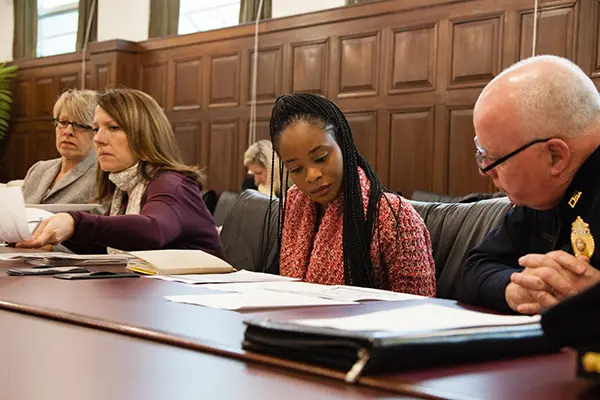Graduate Students Benefit from Research Experience

04/22/2016
By Katharine Webster
In any room filled with community leaders, everyone knows Robin Toof, co-director of the university’s Center for Community Research and Engagement.
For more than 20 years, Toof has built bridges between the campus and city by bringing faculty, students and local agencies together to solve problems, whether it’s improving health care for under-served groups or helping at-risk youth.
Toof and the center’s staff help faculty members manage large grants and find community partners for their research, while also ensuring their research benefits the cities of Lowell and Lawrence. They train professors in how to teach service-learning classes and then match them with nonprofits. They help local agencies and faculty work together to address community needs in programs like Lowell Healthy Homes.
Toof and the center’s senior evaluator, Melissa Wall, also help community agencies apply for large grants, set measurable goals and evaluate the results.
“They’re great at getting everyone in a room and asking questions that get the most comprehensive answers,” says Ellen Carter, program manager for the Lowell Police Department’s research and development office. “They’re always available for technical training and assistance and to help us look at best practices.”
Most recently, for the fifth year in a row, the center is serving as the Lowell Police Department’s research partner on a $564,000 state Shannon Grant to keep at-risk youth out of the criminal justice system, primarily by partnering with community groups that offer boxing, dance and basketball, tutoring and study spaces, job readiness training, outreach workers and summer camps.
This year, the center won a $60,000 partner grant to help the Lowell Police Department and its partners finish updating their strategic plan and measure their results.
“We have been fortunate to partner with UMass Lowell researchers on several grants in recent years,” says Lowell Police Superintendent William Taylor. “The university has brought incredible expertise and guidance to our grant-funded programs and has assisted us to ensure that we are meeting our goals and objectives. Community partnerships are very important to the police department and we hope to continue to utilize UMass Lowell’s vast resources in the future.”

The center also provides valuable research experience – along with a good hourly wage and a full- or half-tuition waiver – to select graduate students in the Community Social Psychology, Criminal Justice and Criminology and Work Environment programs. Assoc. Prof. of Psychology Andrew Hostetler, the center’s co-director, is key to those placements, Toof says.
“All of our projects have students built into the budget,” she says.
Ashley O’Keefe, a second-year graduate student in Community Social Psychology from Litchfield, N.H., says her work as an research assistant aligns with her professional goals: earning a Ph.D. and working in a restorative justice program for young offenders. She collects and analyzes surveys about kids’ attitudes before and after they participate in the various Shannon Grant programs.
“What we’re hoping they’ll show is changes in attitude, improved conflict resolution skills, improved school attendance and grades and better work readiness,” she says.
Liz Ejaife, a second-year graduate student in Community Social Psychology from England, says she’s held focus groups and conducted interviews with program partners, analyzed data, created infographics and written reports for several grants managed by the Lowell police, including one to develop comprehensive services for ex-offenders and another aimed at revitalizing the Centralville neighborhood.
“The experiences I’ve had with the center are really going to help me get a good job in research,” says Ejaife, who plans to work before applying to Ph.D. programs.
Toof and the center’s staff have helped place UMass Lowell on the President’s Higher Education Community Service Honor Roll several years in a row – and win a 10-year Carnegie Foundation for the Advancement of Teaching designation as one of the nation’s most “community-engaged” universities. Toof still sees room for growth, though, especially in the area of faculty-led research that benefits the community.
“We always want to inform a project, help it be the best it can be and communicate the results,” Toof says. “But our main goal is to involve more faculty members in this center who will look beyond service learning to scholarship of engagement.”
